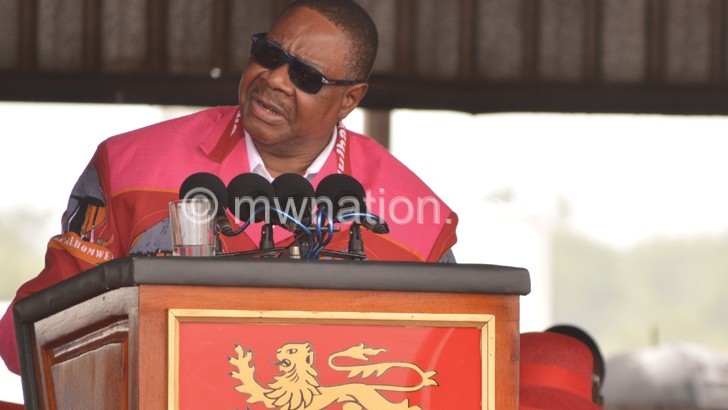Mutharika hits at critics
President Peter Mutharika has hit back at critics of infrastructure development initiatives launched by his administration, challenging that all projects he has laid foundation stones at will materialise.
The President spoke at Bingu International Convention Centre (Bicc) yesterday when he launched the Malawi National Transport Master Plan expected to reduce Malawians’ overdependence on expensive road transport by modernising rail and inland water transport as alternatives.
He said: “That what I do by laying foundation stones, with nothing happening, is false and that is total nonsense. The launch today will ensure the continuation of the structures we have already started.
“Any road I did groundbreaking on, there is construction happening. Go there and see for yourselves. There is progress.”

The President’s reaction follows skepticism from several quarters, including Parliament’s Budget and Finance Committee, which recently feared that the President was busy laying foundation stones for projects as a mere political gimmick as most of them would not take off the ground.
The situation has been made worse by government’s failure to disclose sources of funding for some of the projects.
Yesterday’s launch of the 20-year plan, to be financed by the World Bank and other development partners, comes in the face of the government’s admission that when rail and inland transport systems were ignored in favour of road transport, the country made a major policy error.
Both the government and commentators in the infrastructure development field spoke highly about the estimated K6.6 trillion ($9.1 billion) plan launched at the Bingu International Convention Centre (Bicc) in Lilongwe.
In the plan, the rail sector will extend the railway line from Beira Port in Mozambique, northwards from Mutarara into Malawi in phases. There will also be a spur line from Mbeya in Tanzania to Chilumba in Karonga.
Regarding inland water transport, there will be improvements in the port facilities at Nkhata Bay and there will be roll-on roll-off freight services to Mbamba Bay on the Mtwara Corridor.
Although the plan seeks to reduce people’s reliance on road transport, this sector will not be forgotten.
The national road network will be maintained and rehabilitated, with 1 418 kilometres of rural roads rehabilitated to boost accessibility and agricultural production. Cyclists and pedestrians will also enjoy over 500 kilometres of facilities on high-traffic roads.
Modern facilities, including flyovers and expressways in cities, are expected to revamp the urban transport sector while world class safety and security standards and the development of rural airfield, with an eye of tourism development, will apply in the civil aviation field.
Launching the plan, Mutharika said it was one of the many projects that will transform and modernise the country in the key transport sector.
He thanked the World Bank and other donors and partners for the support they have given towards the crafting and implementation of the plan that will benefit Malawians when they will spend less on transportation, partly because of cheaper alternative modes of transport.
Minister of Transport and Public Works Jappie Mhango said the plan will soon prove to be a game changer, when many modern modes of transport will be introduced.
Meanwhile, some engineers and a social commentator also gave the plan the thumbs up, stressing that lives of Malawians will be transformed if the plan is fully implemented.
Engineer George Kajanga said the plan is long overdue. He pointed out that since the country had neglected the cheaper rail transport for the road transport, Malawians paid highly for their imports and exports.
“As a nation, we lost direction when we neglected the rail industry, which reduces the number of trucks on the highways and reduces the cost of freight. A nation that has good rail and road infrastructure is on the way to development,” he said.
Engineer Witness Kuotcha, a lecturer in transportation engineering at the University of Malawi’s the Polytechnic in Blantyre, said having a plan that can cater for different modes of transport is good as it is a roadmap to achieving good transport plans.
Washington Chimuzu, an engineer and commentator on infrastructure development, said the news of revamping rail transport is good, as it has a very big potential in economic growth.
He said: “My worry is management and maintaining of such; we have already had precedence on current existing infrastructure and also what has happened on Lake Malawi (accidents and old vessels in use). I don’t know what government has decided to do differently to avoid similar failures and negligence.”
Malawi’s exports have not been competitive on the international market due to high cost of road transport estimated at 60 percent.
Previous efforts to find alternative shorter routes to the sea using water as well as rail have frozen with their respective political champions.
For instance, former president Bakili Muluzi’s administration mooted the Mtwara Development Corridor that sought to use water, road and rail to transport goods through Tanzania; however, his successor Bingu wa Mutharika’s administration shelved the plans and embarked on an ambitious Shire-Zambezi Waterway Project that sought to open Malawi to the Indian Ocean port of Chinde, a distance of 235 kilometres from Nsanje World Inland Port, through Zambezi River. The project has also stalled.





